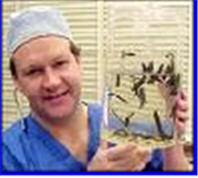Should shrinks be allowed to prescribe leeches?


This may be because people are thinking of diseases like cancer, where a dire prognosis can lead to a frantic search for a cutting-edge treatment that might offer hope. If doctors can't deviate from standard protocols, patients feel they are being killed.
The demand is for open minds. Aren't leeches making a comeback? (Yes, they are, as in this blog post and picture from Shirley Bongbong.) Just not for everything.
One way to turn these perceptions on their head is to look at the world of psychiatry.
There, as legendary psychiatrist Walter (the marshmallow study) Mischel writes this week, the profession is routinely ignoring science. Mischel wrote on top of a study by a panel of clinicians which concludes that training needs to change so that clinicians will use science instead of their gut instincts.
Where's the science, they ask.
In this case, research has gone back-and-forth in recent years on the efficacy of "talk therapy" and drugs. Right now therapy is ascendant, but diagnoses are becoming more specific. Cognitive behavioral therapy, in which patients are taught new ways of thinking about what's in their minds and acting on the new understanding, is on the rise.
But most psychiatrists are not trained in cognitive behavioral therapy. Some do talk therapy, others training therapy, and still others use hypnosis -- there are 1,000 different techniques in use. Scientific research is finding that most just don't work.
They do feel good. And shopping among them does give a patient a feeling that they are in control. Unfortunately you're often choosing among the equivalent of bleeding with leeches, smoke fires with chanting, and exorcism. With, perhaps, a drug pusher on the side.
After doctors start in practice change does not stop. New techniques and therapies are coming available, and are being tested, all the time.
The only difference between this process and the "comparative effectiveness research" so derided by politicians is that the latter is based on more data, and takes costs into account. This can accelerate the speed with which change occurs for clinicians already in practice. When costs are considered it means more people get relief while inflation is kept in check.
What's wrong with that?